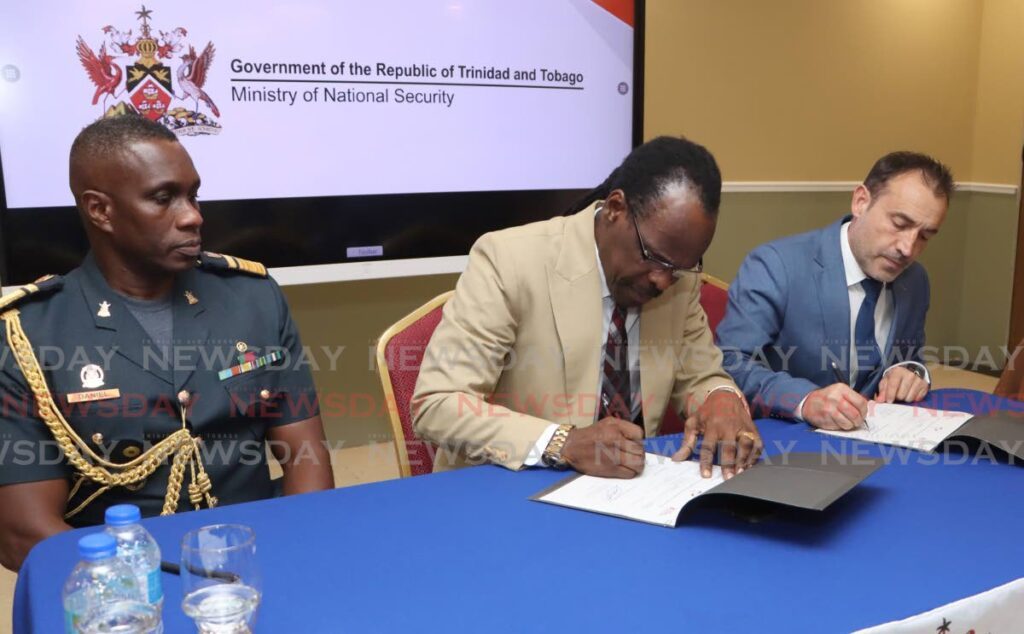UN's Office on Drugs and Crime donates 2 drones to Defence Force

AS PART of its global firearms reduction initiative, the UN's Office on Drugs and Crime (UNODC) has donated two drones to the Defence Force (TTDF).
At the handover ceremony at his ministry on November 20, National Security Minister Fitzgerald Hinds said these drones will help the Defence Force combat the trade in and use of illegal firearms.
“The UNODC continues to provide technical assistance and has donated equipment for use by our national security agencies in our fight against the proliferation of illicit arms and ammunition. This donation of two drones with all the technological advances and benefits…yields another tool in our arsenal in our ongoing fight against crime.
“I am confident this equipment will enhance the Defence Force’s ongoing and future operations to prevent and counter the illicit circulation and misuse of firearms and their links to other serious aspects of national organised crime," Hinds said.
"Law-enforcement authorities have indicated that they have observed a preference for the AR15 and other high-powered rifles by criminals and that firearms have emerged, in their own right, as a profitable trafficking commodity, and Trinidad and Tobago has adopted an all-government approach to treating with this and related issues.
“All of this is aimed at increasing successful rates in prosecution by participating in joint, regional and international operations. And as well, addressing social conditions that contribute to high rates of this country and the wider region.
"In fact, the Prime Minister will be engaged in further discussions with his Caricom counterparts in the upcoming days, shaping the region’s effort as we treat with violence as a public health concern.”
On November 19, Dr Rowley left for Georgetown, Guyana to participate in the second Caricom-India Summit, where he and regional heads of government will work on collaborative initiatives between India and the Caribbean.
Chief of Defence Staff Air Vice Marshal Darryl Daniel said the drones’ advanced capabilities will have a significant impact on the force's operations.
“The DJI Mavic 3 Enterprise drone, with its robust design and advanced imaging technologies is engineered for performance in various scenarios. Equipped with high-resolution cameras and thermal imaging capabilities, this drone will enable the Defence Force to conduct surveillance and reconnaissance missions with increased effectiveness.
“The ability to detect potential threats in the air while maintaining a safe distance is invaluable in scenarios where ground access may be limited and challenging. Based on our research the drone’s battery life can extend operational periods ensuring that we maximise the information gathered during our missions.
“Equally, the DJI Mini 4 Pro drone will serve as a versatile and agile addition to our operations. Whether for search and rescue missions or assessing natural disaster impacts, it will enable us to respond based on accurate information. The advanced features of these drones open up a new avenue for intelligence gathering, situational awareness and operational planning,” Daniel said.
Crime prevention and criminal justice officer at the UNODC, Roberto Rodriguez Codesal, said the drones will help law enforcement stay one step ahead of criminals, who are already using technology to their advantage.
“The introduction of drones in TT’s operations represents a significant help in refining the country’s approach to detection and investigation and the UNODC remains confident and committed to supporting TT on this.
“Together, we will continue to address the challenges posed by illicit firearms trafficking, ensuring that the rule of law prevails and the future and present generations can live in safety and security.”

Comments
"UN’s Office on Drugs and Crime donates 2 drones to Defence Force"